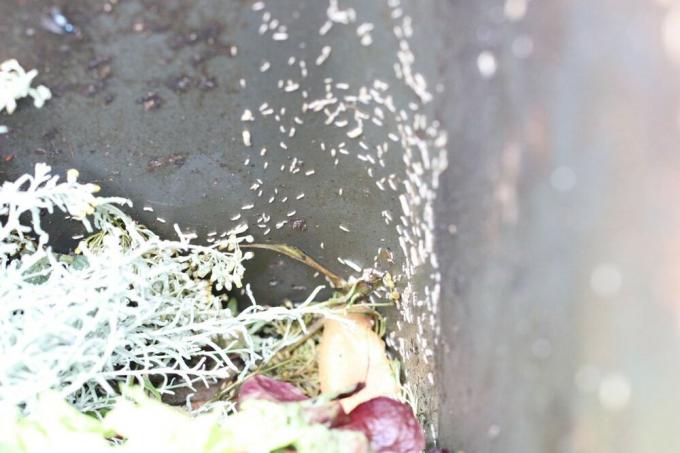

Table of contents
- Maggots in household waste can be avoided
- The causes of maggots - how they end up in the garbage can
- The natural way to fight maggots
- Resist the beginnings - prevention against maggots
- Produce less waste and reduce risks
- Interesting facts about maggots in organic waste
Maggots are formed when flies lay their eggs on food. Especially in organic waste or in household waste, an enormous population can develop and quickly become a disgust factor. It is therefore particularly important to prevent flies and prevent them from laying their eggs in the garbage can.
Maggots in household waste can be avoided
Anyone who opens the garbage can and is greeted by squirming white maggots will usually react with disgust and be less happy about the inhabitants of their garbage can. Maggots are caused by flies that lay their eggs in food leftovers and preferably in meat or overripe fruit. If the maggot-infested garbage is in the house or apartment, a particularly quick action is recommended. Maggots do not threaten health, but are accompanied by a foul smell and create goose bumps on the body.
The causes of maggots - how they end up in the garbage can
As already explained, the formation of maggots can hardly be prevented. As soon as there are flies in the apartment, you don't have to wait long for the maggots. Only regular waste disposal, avoiding biological waste and preventing flies are really helpful. Once the maggots are in the trash can, various household remedies and of course going straight to the bin on the street with the trash bag can help. However, just removing the garbage from the house does not combat the maggot problem, but only serves to change the location of the disturbing roommates. Fly strips can work wonders in the summer months and prevent the Population of the common housefly developed to such an extent that it was able to lay eggs comes. Nappies, leftover meat and discarded fruit and vegetables are particularly attractive to flies. Anyone who throws the biological waste directly into the garbage can in front of the house is at least protected from maggots in the apartment and does not have to expect an unforeseen greeting.
The natural way to fight maggots

If you notice the movement in the garbage can, you will immediately be confronted with a need for action. Reaching for the chemical club is quick, but completely unnecessary with maggots. With natural remedies, the days of maggots are numbered. The following home remedies have proven to be helpful in fighting maggots:
- hot water and pepper
- Garlic
- egg cartons
- Vinegar
- or a steam cleaner.
A mixture of hot water and pepper will get rid of the maggot problem very quickly. To do this, mix the hot water with pepper and pour it directly over the garbage can filled with maggots. Salt is also suitable. If you sprinkle salt over the garbage and do it generously, the maggots will practically dry out and you can enjoy the quick death of the unwelcome residents. After emptying the garbage can, cleaning with a steam pressure cleaner is optimal and allows leftover eggs to be destroyed. Newspaper or egg paper will soak up the moisture. Since the maggot only feels comfortable in damp garbage, draining the garbage can already prevents hatching. Garlic is also a helpful biological remedy. Put some clenched toes over the trash and maggots will not develop in this habitat. In order to prevent the maggots from crawling out of the dustbin, it should be closed properly. Garbage in the apartment is more hygienic if it is packed in special bags. Those who opt for organic bags make a positive contribution to environmental protection and can take helpful action against maggots.
Resist the beginnings - prevention against maggots
Since maggots are fly larvae, you should make it impossible for the flies to get into the trash can. A tightly closed lid of the garbage can plays an important role and prevents a fly from getting through an opening to household or organic waste and laying its eggs there. The dry garbage can is not suitable as a habitat for maggots. If the floor is covered with egg cardboard or crumpled newspaper, the larvae from the fly eggs cannot develop and there is no maggot infestation in the garbage can. Under no circumstances should the garbage remain in the house for too long. Even if the garbage can in the kitchen isn't really full, you should take it to the garbage can in front of the house every two days during the cold season and ideally every day in summer.
Maggots hatch very quickly and develop within a short period of time. But there is no basis for maggots in the apartment if the garbage disposal takes place on a daily basis and the fly larvae are not given a chance to hatch. As an angler, you are happy about maggots and use them as natural bait when fishing. But for every other homeowner or renter, the maggots are associated with a great disgust factor and can be easily avoided with the right tips and tricks.
Produce less waste and reduce risks
Food that has been bought or prepared in too large a quantity is often thrown away. Since these form the basis for the development of maggots, they also serve as the cause of the emergence. If you really want to protect yourself effectively against maggots and avoid populating your garbage can or organic waste bin, you should handle food carefully and avoid unnecessary garbage. Above all, leftover meat or overripe fruit, but also baby diapers are an oasis of well-being for maggots. Since not all rubbish can be avoided, careful handling of the rubbish bin is an important factor in protecting against unwanted settlement. Discovering maggots doesn't have to be a panic. Even if the disgust factor is very high, maggots are harmless and are not considered a sign of poor hygiene or uncleanliness. But they are particularly unpleasant in the house, so a certain level of cleanliness in relation to emptying the garbage can must be observed.

The combination of fly strips near the garbage can and keeping the garbage can dry has proven effective in preventing maggots. If maggots are already living in the trash can, you are well advised to use salt or hot water and pepper. Fresh garlic, paper and even vinegar can drive away maggots and protect them from a new siege.
Interesting facts about maggots in organic waste
causes
- Maggots are larvae of flies.
- Flies lay their eggs in spoiled food scraps. They prefer rotting meat.
- Under favorable conditions, the fly larvae hatch from these eggs after just a few days.
- These then eat their way through the organic waste until they pupate and in turn become adult flies themselves.
remove maggots
There are several ways to get rid of maggots in organic waste. However, chemical clubs are not used here, as they are usually not environmentally friendly. DanClorix for example should not be used as it is not 100% biodegradable. Vinegar, however, is very helpful against the white plague. Simply pour it generously into the rubbish bin, close the lid tightly and leave it, preferably warm, for a few days. The resulting vapors should also kill hardened fly larvae. Sprinkle quicklime over the organic waste, which smothers the maggots, is also helpful.
You can also buy special cleaners for organic waste on the internet or in hardware stores. In most cases, this is litter that is simply sprinkled over the organic waste like lime. After the rubbish bin or rubbish bin has been emptied outside, it must then be thoroughly cleaned. Emptying is no guarantee that all maggots or eggs have been removed. The bucket or barrel should ideally be filled with boiling water or be cleaned with a steam cleaner. Add a little vinegar and everything is maggot-free.
prevention
- On the one hand, the rubbish should always be put in a paper bag, newspaper or special organic waste bags.
- The bottom of the trash can should be lined with newspaper, which is changed each time it is emptied.
- This keeps the soil dry and food does not rot as quickly in the lower layers.
- The trash can should be emptied every day, especially in summer, so that there are no perishable foods lying around in the house.
- If the large bin outside is infested, it helps if the rubbish thrown in there is packed.
- Here, too, it makes sense to line the floor with newspaper and change it after each emptying, even if it is a little more complicated.
- And it doesn't matter whether it's a large bin or a small rubbish bin: regular cleaning never hurts.
 garden editorial
garden editorial I write about everything that interests me in my garden.
Learn more about pests

Identifying wood pests: overview
In nature, insects that break down wood make a valuable contribution. If the wood is a roof truss, for example, the insect becomes a pest that must be combated in order to avoid expensive damage.

Mole Cricket: Should You Fight Them? | Were in the garden
The mole cricket, or Werre, as it is also known, often lives unnoticed in gardens and parks. Because the insect with the scientific name Gryllotalpa gryllotalpa spends a large part of its life underground. Fighting them is only necessary in a few cases.

Combat Whitefly | 11 home remedies for whiteflies
The whitefly is a tiny creature whose presence on our plants can have unpleasant effects. If a few specimens come across a healthy garden, there is hardly anything to fear. If the flies are there in droves, proven home remedies must be used immediately.

Ant remedy | 13 natural remedies against ants
Ants are more than annoying bugs. In nature, they contribute to the preservation of the forest and keep pests away. If they undermine the terrace slabs in the garden or penetrate into the house, they must be fought. Which natural remedies are effective?

How does ant spray work? Is it toxic to humans?
Many people use special sprays from well-known manufacturers when fighting ants. Their effect is indeed efficient. However, these synthetic agents not only have advantages but also disadvantages in terms of environmental impact and health. It is therefore advisable to resort to natural means.

Drive away cockchafers: recognize grubs | 5 natural enemies
"Fly maybeetle!" says an old children's song about death and destruction. In fact, the larvae of the cockchafer, the grubs, can cause considerable damage in some years. How to fight the plague with natural means.



